De Nederlandse dichteres Ida Gerhardt werd geboren in Gorinchem op 11 mei 1905. Zie ook mijn blog van 11 mei 2010 en eveens alle tags voor Ida Gerhardt op dit blog.
Wieg
Geur van honing
en jonge melk
van een nestdiertje
dat slaapt.
Een ademhalen van dons
En speurbaar
aan de neusvleugels
de geur van wat er gebeurd is;
geboorte,
geheim.
De akelei (Dürer)
Toen hij het kleine plantje vond,
boog hij aandachtig naar de grond
en dan, om wortels en om mos
groef hij de fijne aarde los,
voorzichtig – dat zijn hand niets schond.
Behoedzaam rondom aangevat
droeg hij het langs het slingerpad
van bos en akker voor zich uit,
en schoof het thuis in ’t licht der ruit
zoals hij het gevonden had.
Dan, fluitende en welgezind
mengde hij zoekend eerst de tint;
diepblauw en zwart ineengevloeid,
met enk’le druppels rood doorgloeid,
dat het tot purper samenbindt.
En uur aan uur trok stil voorbij;
zó diep verzonken werkte hij,
dat het hem soms was of zijn hand
de vezels tastte van de plant-
zo glanzend kwam de omtrek vrij.
Totdat het gaaf te prijken stond:
de wortels scheem’rend afgerond,
het uitgesprongen groene blad
scherp in zijn karteling gevat
tegen de lichte achtergrond;
de bloemkroon purper violet,
de hokjes om het hart gebed
en boven de geknikte steel
de honingsporen, het juweel
vijfvlakkig: kantig neergezet.
In ’t vallend donker toefde hij
nog dralend bij zijn akelei;
dan, in het laatste licht van ’t raam
schreef hij de letters van zijn naam
en ’t jaartal glimlachend erbij.
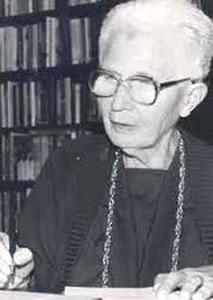
Ida Gerhardt (11 mei 1905 – 15 augustus 1997)
De Braziliaanse schrijver José Rubem Fonseca werd geboren op 11 mei 1925 in Juiz de Fora. Zie ook mijn blog van 11 mei 2009 en ook mijn blog van 11 mei 2010.
Uit: The Taker And Other Stories (Vertaald door Clifford E. Landers)
„I arrived home with my briefcase bulging with papers, reports, studies, research, proposals, contracts. My wife, who was playing solitaire in bed, a glass of whiskey on the nightstand, said, without glancing
up from the cards, “You look tired.” The usual house sounds: my daughter in her room practicing voice modulation, quadraphonic music from my son’s room. “Why don’t you put down that suitcase?” my wife asked. “Take off those clothes, have a nice glass of whiskey. You’ve got to learn to relax.”
I went to the library, the place in the house where I enjoy being by myself, and as usual did nothing. I opened the research volume on the desk but didn’t see the letters and numbers. I was merely waiting.
“You never stop working. I’ll bet your partners don’t work half as hard and they earn the same.” My wife came into the room, a glass in her hand. “Can I tell her to serve dinner?” The maid served the meal French style.
My children had grown up, my wife and I were fat. “It’s that wine you like,” she said, clicking her tongue with pleasure. My son asked for money during the coffee course, my daughter asked for money during the liqueur. My wife didn’t ask for anything; we have a joint checking account.
“Shall we go for a drive?” I asked her.
I knew she wouldn’t go—it was time for her soap opera.
“I don’t see what you get out of going for a drive every night, but the car cost a fortune, it has to be used. I’m just less and less attracted to material things,” she replied.
The children’s cars were blocking the garage door, preventing me from removing my car. I moved both cars and parked them in the street, removed my car and parked it in the street, put the other two cars back in the garage, and closed the door. All this maneuvering left me slightly irritated, but when I saw my car’s jutting bumpers, the special chrome plated double reinforcement, I felt my heart race with
euphoria. I turned the ignition key.“
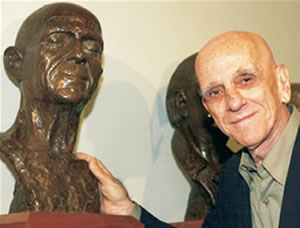
Rubem Fonseca (Juiz de Fora, 11 mei 1925)
De Duitse schrijver Henning Boëtius werd geboren op 11 mei 1939 in Langen, Hessen. Zie ook mijn blog van 11 mei 2007 en ook mijn blog van 11 mei 2009 en ook mijn blog van 11 mei 2010.
Uit: Rom kann sehr heiß sein
“Jeder Mensch braucht seine Wüste. Sie muss nicht unbedingt aus Sand sein. Sie kann auch aus Wasser bestehen oder aus Häusern, aus Menschen, sogar aus einem selbst. Man könnte auch sagen, jeder Mensch braucht sein Patagonien, eine Landschaft, in der Schönheit und Unwirtlichkeit
eine einmalige Verbindung eingehen. Ehe ich diese Lebensweisheit begriff, musste vieles geschehen. Vielleicht ist es besser, die Dinge der Reihe nach zu erzählen, obwohl ich wenig vom Nacheinander eines Ablaufs von Begebenheiten halte. Das konstante Vorrücken des Uhrzeigers täuscht etwas
vor, das es eigentlich gar nicht gibt: Die Zeit ist alles andere als eine Straße, die nur in eine Richtung führt. Wer einmal in einer echten Wüste war, weiß, dass sich zwischen ihren endlosen Sanddünen, die sich alle so ähnlich sind, obwohl keine der anderen gleicht, das Gefühl für Raum und Zeit verliert. Aus dem Nacheinander wird unweigerlich ein Zugleich. Man fühlt sich, spätestens wenn das Abendlicht einsetzt und blaue Schatten die Dünenhänge emporwachsen, als sei man überall und nirgends und das für immer oder auch nur für einen Augenblick. Dieses endlose Rieseln der Sandkörner, das ein feines, fast unhörbares Geräusch erzeugt, verschüttet die Sekunden genauso wie die Jahre. Die Sanduhr, die schon in der Antike als Sinnbild für die Kürze menschlichen Lebens galt, ist in Wahrheit ein Symbol für die Ewigkeit. Wenn der obere Trichter leer ist, dreht jemand sie um, und alles beginnt von neuem.”
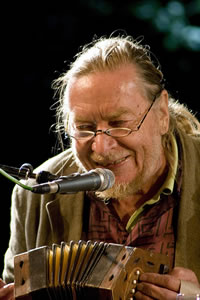
Henning Boëtius (Langen, 11 mei 1939)
De Spaanse schrijver Camilo José Cela werd geboren op 11 mei 1916 in Iria Flavia. Zie ook mijn blog van 11 mei 2007en ook mijn blog van 11 mei 2008 en ook mijn blog van 11 mei 2009 en ook mijn blog van 11 mei 2010
Uit: SAN CAMILO, 1936 (Vertaald doorJohn H. Polt)
“Aviacion remains on the side of the Republic, the first morning birds, the sparrows, like friendly cats, springing and independent, fly chirping over the Republic’s Coat of Arms, at the airdrome of Getafe, Capitan Gascon addresses the troops, we must move against the fascists of the artillery regiment! long live the Republic! you must admit that no one keeps a Phrygian cap in his night table, the insignias that can lead a man to heroism and death only serve to adorn his grandchildren’s carnival, already on the way and if by chance three groups are formed under the commands of Teniente Fernandez Franch, Teniente Valle and Master Sergeant Sol Aparicio, with them also go four dozen civilians of the United Socialist Youth and the Communist Party armed with rifles, romantic and prestigious machines, the artillery regiment does not put up too much resistance and surrender at the first air attack, attacking Campamento is more difficult, the airplanes from Cuatro Vientos bomb the barracks of the regiment of Engineers and kill an officer, the situation is confused, General Garcia de la Herran, Coronel
Cañedo, and Teniente Coronel Alvarez Rementerria study the plan of attack, no, the prudent thing to do is to place two artillery pieces on the road and two heavier ones on the esplanade, it is necessary to prevent any attack by land and put Cuatro Vientos out of commission, Teniente Coronel León Trejo refuses to surrender the airdrome to the Military Junta, long live the Republic! we must not attempt to march on Madrid under fire from the air, order to unhitch! at the barracks of La Montana the situation is not desperate, long live Spain! they have not yet been attacked, there is no news of the engineers regiment of Leganes, nor from the other barracks in Madrid, it is still night, perhaps it is dawning bit by bit, the attack on Campamento comes as a surprise, where did these clowns get that artillery?”
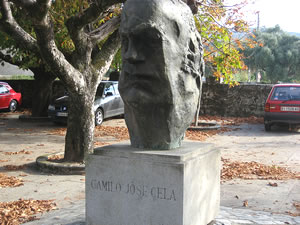
Camilo José Cela (11 mei 1916 – 17 januari 2002)
Buste in Iria Flavia
De Oostenrijks-Roemeens-joods-Amerikaanse dichteres Rose Ausländer werd geboren in Czernowitz op 11 mei 1901. Zie ook mijn blog van 11 mei 2007 en ook mijn blog van 11 mei 2008 en ook mijn blog van 11 mei 2009 ook mijn blog van 11 mei 2010
Mutterland
Mein Vaterland ist tot
sie haben es begraben
im Feuer
Ich lebe
in meinem Mutterland
Wort
Das Glück
Schlafen möcht’ ich,
Der Wind wiegt mich ein,
Und die Sehnsucht singt mich zur Ruh’.
Weinen möcht’ ich.
Schon die Blumen allein
Flüstern Tränen mir zu.
Sieh die Blätter:
Sie blinken im Wind
Und gaukeln Träume mir vor.
Ja und später –
Lacht wo ein Kind,
Und irgendwo hofft ein Tor.
Sehnsucht hab’ ich
Wohl nach dem Glück?
Nach dem Glück.
Fragen möcht’ ich:
Kommt es zurück?
Nie zurück.
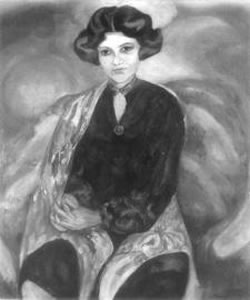
Rose Ausländer (11 mei 1901 – 3 januari 1988)
Zie voor nog meer schrijvers van de 11e mei ook mijn vorige blog van vandaag.
